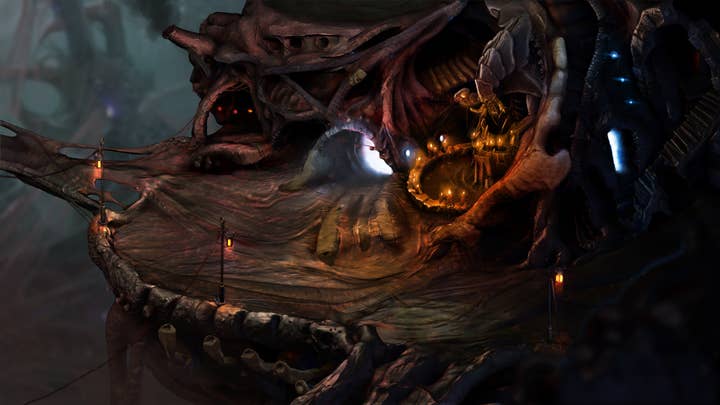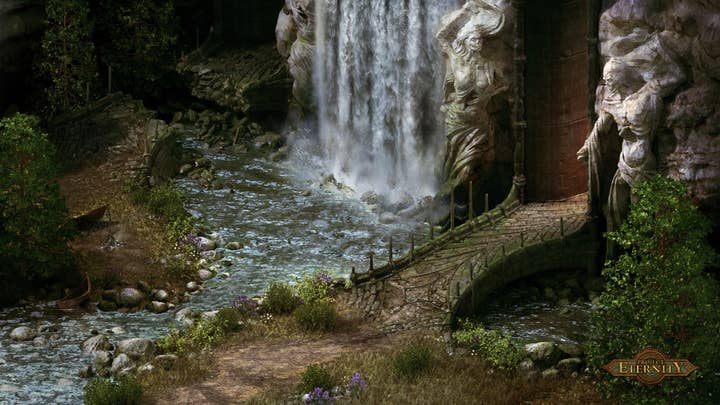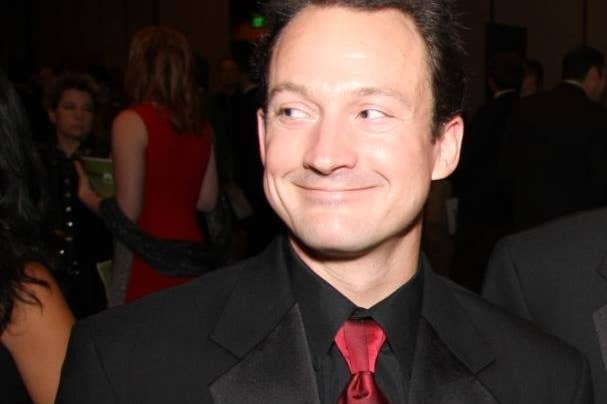Man of Many Parts: Chris Avellone's busy schedule
On Wasteland 2, Planescape, South Park and Project Eternity
Chris Avellone is a resource very much in demand. Working not only on the 'day job' for Obsidian which entails Project Eternity and South Park: The Stick of Truth, Avellone has also become involved in two projects which have a lot of resonance for him. Joining his old comrade Brian Fargo to work on Wasteland was a 'no-brainer', but he's since been commandeered to work on Torment: Tides of Numenera, after becoming his a human stretch goal for the project.
You suspect that wasn't too difficult a choice to make either, speaking to him. Having been the creator of Planescape: Torment, he's obviously close to the project in spirit, but he's also relishing the chance to be back at the coalface for the semi-sequel. Read on for a chat with Chris about his current workload and an update on the projects he's involved in.
I finished up with Wasteland last year. It was mostly doing all the design pre-production work like laying out the maps, designing what creatures might be in the area, any dialogues or descriptive text and also hashing out the final storyline, the overall flow for the players over the course of the game. But once that was done they were like 'you know what? We're good' and all the designers were like... I think they have one full time writer still on Wasteland 2, Nathan long, and he's the one that does any adjustments they need for the story or the text, and any other writers they're going to move on to Torment.
I think Brian and the crew are really comfortable with Patrick and Nathan and everybody else so now that they've all been working together for a while and Brian really likes the tone of that guys writing and they're good writers. I think it's just a matter of like 'we'll just keep these guys working in the studio and they'll be good for Torment' - so I think it's going to work out pretty well.

To be honest all of us were kind of taking a step back because we weren't sure how a second Kickstarter would go. We hadn't finished the first one so it was kind of like 'I wonder what's going to happen here', and I think Brian himself was a little... he wasn't sure how it would go either but then it took off in the first day and I guess six or seven hours later they were like 'well, time to make some stretch goals!' That worked out pretty well.
Yes, the duties they have me doing are that I'm going to do overall design documentation - kind of like I did with Obsidian. I'm going to look over the storyline I'll look over the systems and I'll offer feedback and thoughts on that. Me and Colin have worked together for a number of years so that should be pretty copacetic, and me and Kevin too. Kevin Saunders is the project lead, Colin is the lead designer. Colin was the second designer who came onto Torment back at Interplay, and he was with the project all the way through up until that point.
"Numenera is much more free flowing, much more story focused, and Eternity is stuff like dungeon exploration, party team, how do you approach a problem, how do you approach an encounter"
So I'm going to review the design documentation, offer feedback on that, and also they have me writing the eighth companion for the game; that's currently the sum total of my duties.
Yeah, I think that's a good question to ask. I think it's because the settings in Wasteland and Eternity and Numenera are all so different...I think that kind of makes it safe. Because ideas that fit really well into the new Torment game, like it's crazy how similar the locations can be, they wouldn't fit quite as well into Eternity. Eternity has more elements that, while not being like D&D, Forgotten Realms definitely has hallmark D&D bits about it. Numenera is much more free flowing, much more story focused, and Eternity is stuff like dungeon exploration, party team, how do you approach a problem, how do you approach an encounter. And then the games just feel a lot different in terms of aesthetics. I think prevents a lot of design bleed between the two.
One of the designers was talking about one of the areas for Torment and it's basically this big living dungeon that communities live in, and also monsters, and depending on what you feed the dungeon it opens up new portals to other dimensions and it moves around. If anyone attempts to ever quantify the dungeon, and say 'I'm going to try and measure how big it is' or what intelligence level it is they're mysteriously destroyed. And I'm like: this is the craziest and most awesome fucking dungeon ever, but that's not something we would do for Eternity. Eternity would be much more like: here's the architecture for a dungeon that was exploring soul mechanics. So I think the two aesthetics between them sort of help.
It's also good from the writer's block standpoint where I can go: this idea will work really well in Torment so I can really roll with that, but when I get writer's block there then I can switch over to Eternity and do something else. It actually works out pretty well.

There's a lot of hallmarks like dwarves and elves but I think the cool thing that the project director Josh Sawyer has done is he's made a conscious effort to make sure that even though the word dwarf and the word elf is there to bring you in and understand the general concept, then he does a lot of cool cultural twists and racial twists that clearly set them apart. I mean he's really good about that, and I'm sure he'll talk more about that in future updates, but he's really really good about that.
Josh felt pretty strongly about exploring a tech level for the game and I think it was the right decision. And also the way that different fighters and combatants in the game use those bits of technology to sort of overcome typical arcane defences creates this interesting tension between wizards and fighters so it's kind of an interesting spin.
The most I can say about South Park in an official capacity is that the transition from THQ to Ubisoft was pretty smooth, and there weren't really any problems with that.
"I don't think most people outside the gaming arena actually get as involved with Kickstarter, it's more like a subset of really dedicated gamers that already know who those personalities area"
I think I'd probably take a step back from the answer and just see how AAA titles treat that. because I even feel like even when you're dealing with games like Ultima or if you're dealing with Gears Of War. e I don't necessarily feel that common public knows who Richard Garriott is, nor would they know who Cliffy B is. People in the industry obviously will but I don't know if that cult of personality status ever goes beyond the people who actually are more inside the gaming arena. My feeling is that is doesn't.
In terms of alienating their... so therefore my question with Kickstarter is I don't think most people outside the gaming arena actually get as involved with Kickstarter as a result, it's more like a subset of really dedicated gamers that already know who those personalities are or know what that type of game is or know why that game concept is interesting or they know why those people left that studio or what their personal story is. And I think that all factors in.
But in terms of whether figures like that can alienate or sort of upset the rest of the team...I suppose that's always a danger. I think that the thing to do is, I think personalities like that have a responsibility to call out specific people who have done great work on those titles. Just because obviously those personalities certainly have not come up with all of the systems, or even a good percentage of the systems for those games even though they might be the mouthpiece for the game. So I think that's a real danger and I think that in their role they have a responsibility of making sure that the people that contributed the work that is making everybody successful is being called out specifically and I guess that's my thought.
So there's a few answers to that question. First off, I mean the general trend I feel that there's a lot of publishers are taking more care and thought and spending more resources on making sure they're developing good stories for games because they see the profit return that having those stories elements woven in even to a first person shooter - like Half Life obviously took that first step where you're like you know what? As much as you're used to a shooting title now we're going to add all this brand new stuff you normally don't see and suddenly that made it stand out from the crowd and obviously did very well for them.
And then obviously games like Mass Effect, all the Bioware games, like they have proven what a strong storyline means for keeping your player base. And every convention I go to seeing like the people dressed up at those characters or going up to someone and saying I've formed an attachment to this person you wrote/developed/voice acted, I think that sends a pretty clear signal about how important narrative and getting immersed in the story is.
The other part of the answer is if I understand correctly I think the narrative track from Austin GDC got moved to this convention when they actually cancelled Austin GDC and now all those narrative tracks take place here now so that could account for some of the presentations but I don't think it would account for all of them.
"Games like Mass Effect, all the Bioware games, like they have proven what a strong storyline means for keeping your player base"
The care that people are taking with stories is just getting even better like... So Ken Levine was very nice, so I got a chance to play BioShock Infinite and some of the biggest punches in that entire game, and I only played it for like 5 hours or so, but the biggest punches that occurred for me were all narrative set-up. Like there were some decisions that just surprised the shit out of me, and then horrified me, and I'm like wow, none of this involves shooting mechanics or character stat development, it's all in the presentation of the story and it just amazed me, it was really well done.
I think it already happened with Walking Dead. As I was playing it I almost, and this is no... like I respect Telltale a lot but there were times when I wished some of the adventure game elements would go away and they would just do the reactivity and the character decisions because they were doing such a great job with it that anything else felt like a distraction.
It really encouraged me because to see such an outpouring of support for what is largely a story focused game like that just gave me new hope that there is a market for that and it can be successful. They did a fantastic job with it.
"I think the thing that surprised me most about that presentation was even though the game demos looked good, what really surprised me and I thought was kind of genius, was the share button"
I think the thing that surprised me most about that presentation was even though the game demos looked good, and like you say they had a really strong line-up of talented developers who were talking about the titles what really surprised me and then I thought was kind of genius was the share button. Because that immediately made me think well how many let's play videos are there of New Vegas on the net? Where someone is showcasing one minute where they do something amazing with a character - Grand Theft Auto is full of that - and then I'm like "ohhhhhh."
That can be a powerful community tool, but then that got followed by the pragmatic view that as a studio we would have to not only worry about the core game, but then we'll have to expand the staff to make sure that we have the web coverage and the programming and personnel support to make sure that all those share features work properly. Which shouldn't be a big deal, but it just means the team size will get larger as a result, there's more baggage.
But overall I think it's something players are really going to love because they've been trying to do it so much anyway, but now there's a much easier way, and I'm like oh that's smart.
No, it doesn't worry me because that does two things - it makes us what to do more due diligence to make sure those things don't happen in the first place, and second of all if something does slip through having actual coverage of it somewhere - preferably with an email address associated - allows us to address it with a patch. It's never our intention to let something like that get into the game, but being able to record that easily and have that available somewhere... I just want to check on the problem and fix it.
And then again, seeing videos of someone putting a bucket over a guard's head and doing all the pickpocketing is actually really entertaining and it makes me want to try that in Skyrim and have even more fun, so I don't care, that's great.

